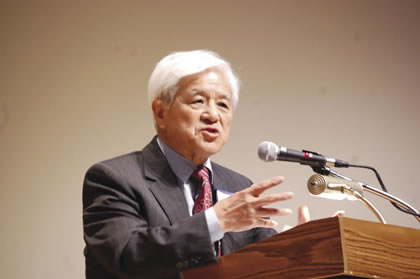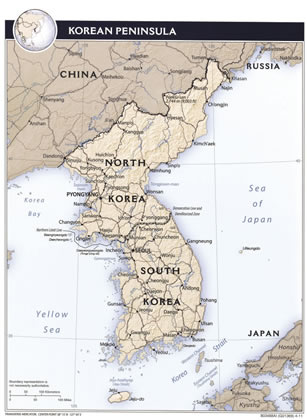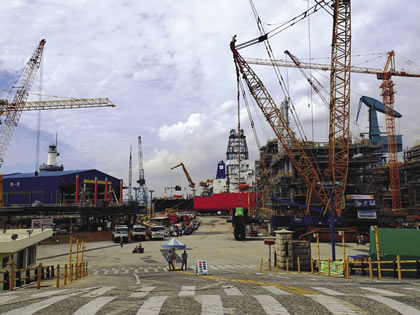SCHILLER INSTITUTE CONFERENCE
Building A World Land-Bridge:
Realizing Mankind's True Humanity
Thursday, April 7, 2016, 9:00am - 9:30pm
NEW YORK CITY
Panel I: The New Silk Road Becomes the World Land-Bridge
The New Silk Road and Korean Unification
presented by Jai Poong Ryu

EIRNS/Stuart Lewis
Professor Jai Poong Ryu, of the One Korea Foundation, advocated the unification of Korea, and identified the pitfalls to be avoided, in his address to the April 7, 2016 Schiller Institute Conference. |
Program and video
Invitation
A PDF version of this article appears in the April 22, 2016 issue of Executive Intelligence Review and is re-published here with permission.Jai Poong Ryu, of the One Korea Foundation, delivered this presentation at the April 7 Schiller Institute Conference in New York City.
Dennis Speed: United States troops have been stationed in Korea since about 1950; there are still about 28,000 U.S. troops there. Korea is still divided. Why? With the possibility of Russian, Chinese, and American cooperation never being more obvious than in Korea’s case, would not the reunification of Korea, like the reunification of Germany, be a possible opportunity for a new era in world diplomacy?
The next speaker offers a perspective for unification: peace through development. Please join me in welcoming Prof. Jai Poong Ryu, retired from Loyola College, who is the founder of the One Korea Foundation.
Jai Poong Ryu: Thank you very much. I consider this to be quite an honor, personally and otherwise, to be invited to speak at this very important and timely Schiller Institute conference this year.
Helga LaRouche spoke of the need to go beyond the geopolitical considerations and polarity, and that’s a very timely comment, because of the geopolitical considerations of the powers beyond Koreans’ control that caused us to be divided, 71 years ago. It was the geopolitical consideration of disarming the Japanese Imperial Army north of the 38th parallel by the Soviets, who had just entered the peninsula, and south of that parallel by United States forces, which came a little later.
We remained divided for 70 years, and the geopolitical considerations of the world continue to keep the peninsula divided. Now it is time to pay some attention to that.
Attorney General Ramsey Clark talked about many global issues—environment, poverty, income disparity—but alongside all of these problems is also the problem that there is nobody really talking about the Korea issue, or thinking about it. The many problems we have may seem to be enough, but nobody is really addressing the Korea issue, which is very depressing.
I admire the accomplishments of this Schiller Institute, and I hope to convey some ideas about Korea, so that you can somehow find some link between what you are also after, that is, a World Land-Bridge, and how it might have some implications for Korean unification.
 View full size Map of North and South Korea. The combined territory of the two is approximately equal to the size of Utah. South Korea has a population of about 50 million, while North Korea has a population of about 25 million. |
Since my retirement four years ago, my time and attention have been devoted to Korean unification. This goal of Korean unification, however, is unlike some other things I have done. It is not really a goal-oriented endeavor, but is more a long-term direction-oriented endeavor. Because I will be 75 years old in October of this year—and if I have a lifetime goal that I want to implement in the next five years, it will be too depressing to see the reality. The indicators are too discouraging and frustrating, and I may actually give up before I start.
Instead, I have to think about a more general direction we want to move in, and I will just carry it out as far as I can go and let my effort stop there, and then let the issue follow along. So it is more in that spirit that I do what I do. Because, once Korean unification is mentioned, in and out of Korea per se, there is a plethora, a whole gamut of opinions. On the one hand, you have people who think that unification is not desirable. They think that the status quo is quite beneficial. All the powers around Korea seem to think so.
China intervened in the Korean War out of geopolitical considerations, not wanting to be confronted with American forces across the Yalu River. And that continues to this day.
Japan finds that South Korea’s emerging industrial power is strong enough to rival them. Therefore, to them, a unified Korea is not welcome news.
The United States, too, does not find unification particularly desirable. And there are some sinister interpretations that there is a hidden hand in the United States that likes to keep Korea divided, so that Koreans can continue to buy arms, guns, and tanks, and that there are people who make money from that. I don’t know. I have never really looked into it. Actually, with all the scholarship devoted to it, there have been very few figures, numbers, or tables produced to demonstrate that. So the rumor, whether it’s really true or not, continues.
Comparison with German Unification
And there are people who believe, especially comparing Korea’s situation to Germany, that Korea has been divided for 70 years, but it’s only been since German unification that the idea of Korean unification has become a little more real to Korean people. But then, if we compare East and West Germany to North and South Korea, the signs are more depressing. West Germany was much richer than South Korea, much bigger than East Germany—vis-à-vis East Germany to West Germany; it was three times the size. North and South Korea land-wise are about the same; the population of South Korea is twice that of North Korea. So West Germany was much richer than East Germany.
You know, at the time of German unification, East and West Germans sent letters to each other, there were telephone calls, they exchanged Christmas cards, they visited each other. Nothing like that has happened in Korea. The recent divided families, at one time some 10 million individuals, about a quarter of that number of families being the number of families involved, remained divided. And when they tried to give them a three-day reunion, it took three years of preparation, and it’s a terrible thing.
So, when we compare the Korea situation to Germany, the idea is that we cannot afford it. The West German economy suffered from it, and even today in Germany, there are people called “Ossies” and “Wessies” [Easterners and Westerners], and there is prejudice, and all the blame tends to be placed on something that went wrong through the reunification process. Korea doesn’t want to repeat that, and we definitely cannot afford it.
On the other side, there are people who believe that unification is not desirable because the status quo is not too bad, both internationally and domestically.
 View full size creative commons/Sarah Tz
Augmented by an industrialization drive beginning in the late 1960s, South Korea went from dirt poor to an economy that ranks from 10th to 14th largest in the world. By 2014, South Korea was the seventh largest exporter and seventh largest importer in the world. Here, a Hyundai Heavy Industries shipyard in South Korea, 2014. |
South Korea was an impoverished nation! When I left Korea in 1965, per-capita income was $100 per person [per year], at the level of perhaps Uganda or Rwanda in Africa today. Today, South Korea is by some measures the 10th to 14th largest economy in the world—and about half the size of Utah.
That’s a remarkable accomplishment. In the post-World War II period, since 1945, South Korea is the only country, that out of utter dirt poverty, accomplished a true industrialization and democratization—it’s a proud heritage.
So, now we can make a living. We don’t have beggars any more, we don’t have starving people any more. We don’t have a budget that relies 60% or 70% on American foreign aid. We give foreign aid, we help many parts of the underdeveloped world. So, we can now live. But if Korea is suddenly united, South Koreans are afraid that we will then have to guarantee the basic livelihood of 25 million people. We can’t afford that. There are people who believe we cannot afford that. They think status quo is therefore not so bad.
On the other side, there are people who believe in “unification at all costs” no matter what, even if it takes some bloodshed. They think unification is a must, that Korea was always a unified country, one people, one land, and it must be put together again.
What Kind of Unification?
I don’t belong to either camp. I want to see—and I speak for the One Korea Foundation—a particular kind of unification. If Korea somehow united through military means, or through a sudden collapse of the Kim family, the dynasty of the regime, then the chaos would be such that there would be no force, no personal or leadership caliber that could possibly control this. Therefore, without great preparation, a painful, gradual, solid effort on the part of both South Korea and North Korea, closely supported and coordinated internationally, with the involvement of China, the United States, Japan, and Russia—arguably the four greatest powers of the world—Korean unification would not be possible.
What kind of Korean unification do we want? Korean unification must be done by the Korean people. We will not ask other people to do it. Although we were divided by others, we will unify ourselves. But we cannot do it alone, definitely not! Especially if anyone is actively opposed to it. Even in a very illustrative presentation by Professor Li of the Silk Road, there is one country that’s not mentioned—Bangladesh, Pakistan, Tibet, Kazakhstan, Xinjiang are mentioned; but not a word of Korea. China calls itself the Middle Kingdom, and now, in the Silk Road concept it defines itself as if it’s the Far East, not the Middle any more. In order to be Middle, it had better include Korea.
What Unification Will Mean to Koreans
When Koreans think of unification, newspaper columnists and college professors talk about what unification will bring to Korea. Korea is a peninsula. But South Korea has been a virtual island: Three sides sea, and the Demilitarized Zone. We have been living on an island for 70 years. So one dream for the unification of Korea into one, is somehow an idea that college freshmen and sophomores will take a backpack and get on a cross-continental Eurasian railroad, and go all the way to Madrid, to Venice, and they get excited about that. This is one of the ingredients of the dream that is keeping unification alive in the minds of the young people in Korea.
Michael Billington was so good as to have a copy of my Declaration for Unification prepared for you—do you all have it? I would be very honored if you would take the time to read it. It is not much of a document of literature, perhaps, but it took me seven months to write it, to revise it, to change every word—every word! I must have spent hours on it. So, just take pity on me, and have a good read.
Now, the type of unification we want is not really that easy. It takes some very, very specific measures. When Korea is united, the basic idea is that people will travel south in search of a better standard of living. Money will travel north in search of profit. How many people will come down? How much money will go north? These questions are a kind of mathematical equation. There is some formula there. For ten years at least, after unification, South Korea and North Korea must be run as two economic zones.
Helmut Kohl of West Germany made three mistakes at the time of German unification, and they told us so. And we’ve learned a great deal from the German experience, and hopefully will not repeat the same mistakes.
One is that they equalized the wage structure of East and West Germany, and declared that the deutschemark of the two countries was of the same value. Secondly, Helmut Kohl also made it possible for West Germans who had lost property in East Germany to reclaim it. They said, in the ten years after German unification, 230,000 lawsuits were filed in the German courts, so Korea must not repeat that mistake. So, we will have to be very careful about this.
The third is a very tough call. We have to persuade the international community that for a ten-year period after unification, there should be a Bi-Korea policy, instead of the resources, the hardware, and the capital for the infrastructure building of North Korea—including the building of power plants, roads, railroads, refurbishing harbors, and so on—only coming from South Korea. Otherwise, it will be very, very difficult. The Korean economy is just not as a big as that of Germany. We will not be able to sustain it, and I may regret that I talked about unification, considering what we have brought up here.
The One Korea Foundation at this time has a very limited purpose. Last year in commemoration of our seventh anniversary, we held a big banquet in the Senate caucus room, and held a big rally at the Lincoln Memorial, whose legacy we want to borrow: “With malice toward none, with charity for all,” in Lincoln’s second Inaugural Address: That is the spirit in which we want to unify our country.
So, in one of our first efforts, we have to come to what we call AOL—American Opinion Leaders—and they’re found in the business world, in academia, in the press. We would like to be a sort of top-notch website in the next couple years or so, so that this is the site these opinion leaders come to when questions about unification arise.
And we want to redefine the United States-Republic of Korea alliance so that it will cover security measures not just involving U.S. and Korea. The R.O.K.-U.S. alliance is based on the idea that the United States will come to the defense of South Korea against North Korean aggression. It presupposes the division! The whole alliance is premised on the fact that the country is divided and will continue to be divided. We must find—as Helga LaRouche pointed out—we must find a formula beyond that. The U.S.-R.O.K. alliance must not be for defense only, but for one Korea, for Korean unification. It remodels all issues in a different type of framework.
And I think President Xi Jinping very much included Korea in his talk with President Park about his proposed New Silk Road. So, maybe next time, Professor Li will bring his students to visit Korea, the easternmost end of the Silk Road and World Land-Bridge. In my view, the World Land-Bridge starts with Korean unification. And as some friends once said: Let there be peace on Earth, and let it begin here, with us, with Korean unification.
